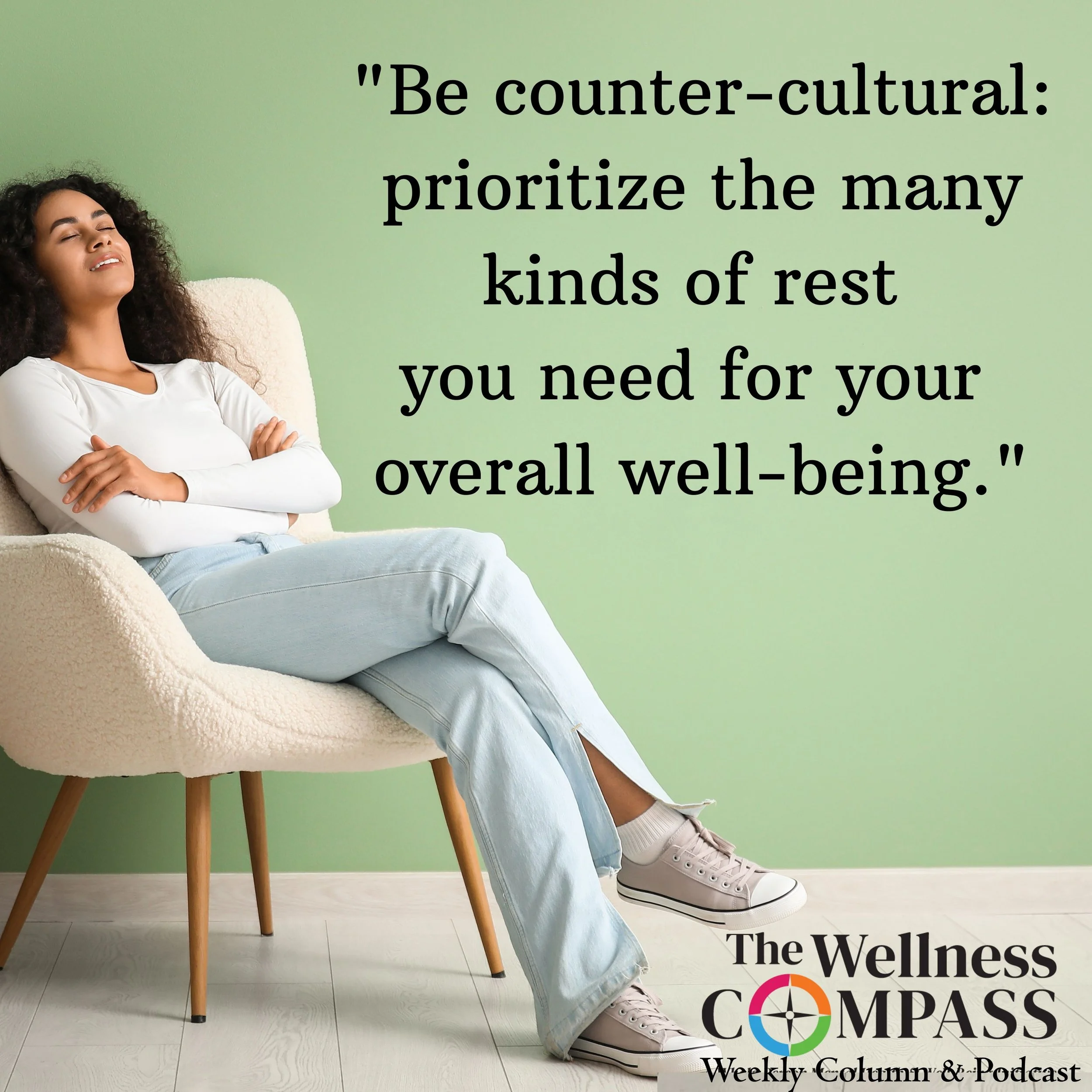(Click on the player at the top to listen to this ten-minute episode)
What follows is the weekly column we email every Friday that is a companion to this weekly podcast. This podcast episode expands on the content of the column. You can subscribe to the weekly column HERE.
Our Need for Different Kinds of Rest
Our Wellness Compass Initiative is a holistic approach to wellness. With that in mind, we offer four "Compass Points" that speak to multiple dimensions of rest, as well as help us become aware of our inner attitudes about the role of rest in our lives.
1. Physical Rest: It's not just about enough sleep
There are numerous studies on the connection between various diseases and chronic sleep deprivation. "I'll sleep when I'm dead" takes on a new meaning when we fool ourselves into thinking we can ignore the biological basis of needing adequate sleep. Not getting enough sleep affects our mental health and our relationships, too. Irritability is just one symptom of low sleep. Beyond sleep, we will also benefit from restorative practices that nurture our physical well-being, such as walks (when possible), stretching, and yoga. We only get one body to live in. Being sure it gets enough rest and renewal is essential to our overall well-being.
2. Mental Rest: Reducing Cognitive Overload
Our minds process thousands of thoughts daily, and the constant demands of decision-making, problem-solving, and listening to or scrolling through the news of the day can create excessive mental fatigue. Restorative practices for mental exhaustion can include taking a break from the news for a while, making time for meditation, spending time outdoors in nature, or listening to music. When our mind feels foggy or we struggle to concentrate, we are not being lazy—we are experiencing mental exhaustion that requires rest and renewal.
3. Emotional Rest: Permission to Be Authentic and Practice Self-Care
Two primary causes of emotional exhaustion are caregiving for others and being constantly "on" for others, where we don't feel safe expressing our true feelings; instead, we present a facade. Emotional rest can be found when we can balance caregiving with self-care, recognizing that self-care is not selfish. Rest also comes when we have safe spaces—whether it's with trusted friends or family, or perhaps a therapist — where we can drop our masks and authentically share all our emotions.
4. Become Aware of Our Mindset Regarding the Importance of Rest
We live in a culture obsessed with busyness, where we are more like human doings than human beings. It hasn’t always been so. Ancient cultures prioritized the importance of sabbath time. At Wellness Compass, we often discuss becoming more aware of the many compasses that guide our habits and behavior—often outside of our conscious awareness. Busyness and an over-identification with achievement and action are inner compasses that sometimes minimize or even ridicule the importance of rest. Being tired much of the time can even be seen as a badge of honor in many circles. Therefore, it is essential that we surface our own deeper attitudes about rest and recognize that in our fast-paced world, prioritizing rest and self-care may feel counter-cultural. Making this counter-cultural choice, though, is essential to our overall well-being.
Making it Personal:
As you read points 1-3, is there an area of rest that could benefit from your attention at this time?
If so, what's one thing you can do in the day or week to experience some rest in that area of wellness?
Reading point 4, are you aware of any attitudes or biases you have about the importance of rest?
And please remember to subscribe to this podcast to get updates regarding new episodes. We would also appreciate you reviews and ratings in your app, as well as helping us to grow this nonprofit podcast by sharing it with others. Thank you!
There is a weekly Wellness Compass Column that is emailed each Friday morning that corresponds with this podcast. You can sign up to receive this free weekly email at www.WellnessCompass.org
Sign up for Your Weekly Wellness Compass to receive weekly an email each week that announces when a new podcast episode has been released and also includes a transcription of the episode for those who prefer to read instead of listen. Each episode is designed to help you for navigate your week ahead with clear attention and intention.
ABOUT THE CREATORS:
Holly Hughes Stoner, LMFT and Scott Stoner, LMFT, are both licensed marriage and family therapists who are partners in life and in work. They are the Co-Directors and Co-Creators of the Wellness Compass Initiative, a non-profit initiative that crates preventative wellness materials for adults, families, and teens. They live in Madison, Wisconsin and are the parents of three adult children and are blessed with two grandchildren, as well.






